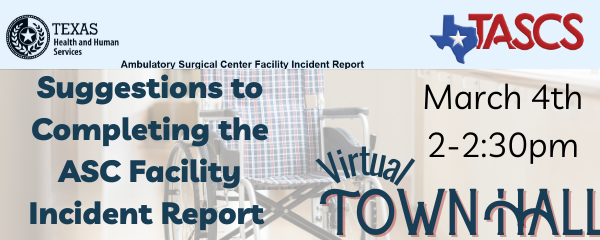
Membership Monday: Digestive Health Center of Allen

Membership Monday: Digestive Health Center of Allen
On March 4, Texas Ambulatory Surgery Center Society members attended a virtual town hall, in order to learn best practices on proper incident reporting to Texas Health and Human Services.
Laura Schneider RN, Sr. Director of Clinical Services for Amsurg, began by reviewing the requirements of ASC Incident Reporting:
Patient Safety Awareness Week encourages people to learn more about healthcare safety, and this year, it takes place March 14–20, 2021. This topic can include the reporting, prevention and reduction of issues that harm patients and others in medical settings.
ASC Accreditation During The COVID-19 Pandemic
The Texas Ambulatory Surgery Center Society provides members with information and education through bi-weekly virtual town halls. On February 11, members learned what to expect in regards to surveys for accreditation programs during the COVID-19 pandemic.
|



We apologize for any inconvenience but we are rescheduling next week's event due to the inclement weather and power shortages that our ASCs have experienced this week.
A future date is TBD and will be announced when available.
In order to provide members with information and education, even in the midst of a pandemic, the Texas Ambulatory Surgery Center Society (TASCS) has been holding virtual town halls. The latest one took place on Jan. 28 and was about controlled medication logs in ambulatory surgery centers.
It was a focused, brief, yet very informative symposium from two of Texas’ top experts on the topic, Diane Buffington of Surgical Care Affiliates and Chris Dembny of Dembny Pharmacy Consultants LLC.
Austin, Texas-based Pain Specialists of America named Pankaj Mehta, MD, as its chief medical officer, according to a Feb. 2 news release.
Dr. Mehta is a board-certified anesthesiologist who gained national recognition for his contributions to interventional pain medicine, the release said. He is a leader in pain management with a focus on spine pain, headaches, spinal stenosis, abdominal and pelvic pain. He trained at Harvard Medical School and Massachusetts General Hospital, both in Boston, before completing a fellowship at Cleveland Clinic.
JAMISON, Pa., Feb. 3, 2021 /PRNewswire/ -- Five Physicians Endoscopy partner ambulatory surgery centers have received the 2020 National APEX Quality Award. The Endoscopy Center of Niagara, Laredo Digestive Health Center, Long Island Center for Digestive Health, PGC Center for Excellence, and South Broward Endoscopy Center were recognized as the highest performing healthcare facilities within their healthcare peer grouping. Awarded annually by SPH Analytics, recipients of the APEX Quality Award are determined solely by patient satisfaction measures. APEX, traditionally meaning highest point, is defined by SPH Analytics as "Attributes for Patient Excellence".

[Photo by Dave Adamson on Unsplash]
|
|||||||||||||||||||||||
|
SUMMARY: The Drug Enforcement Administration (DEA) is amending its regulations to implement a new single-sheet format for DEA Form 222, used by DEA registrants to order schedules I and II controlled substances. The rule provides for a two-year transition period, during which the existing triplicate version of the forms may continue to be used. The rule also includes a number of minor procedural changes.
https://www.deadiversion.usdoj.gov/fed_regs/rules/2019/fr0930.htm

Kim Russell is the chief executive officer of Westlake Hills Surgery Center. She is also an athlete, a four-times world champion gold medalist in racquetball, an animal rescuer, a mother of two girls and a leader in the industry.